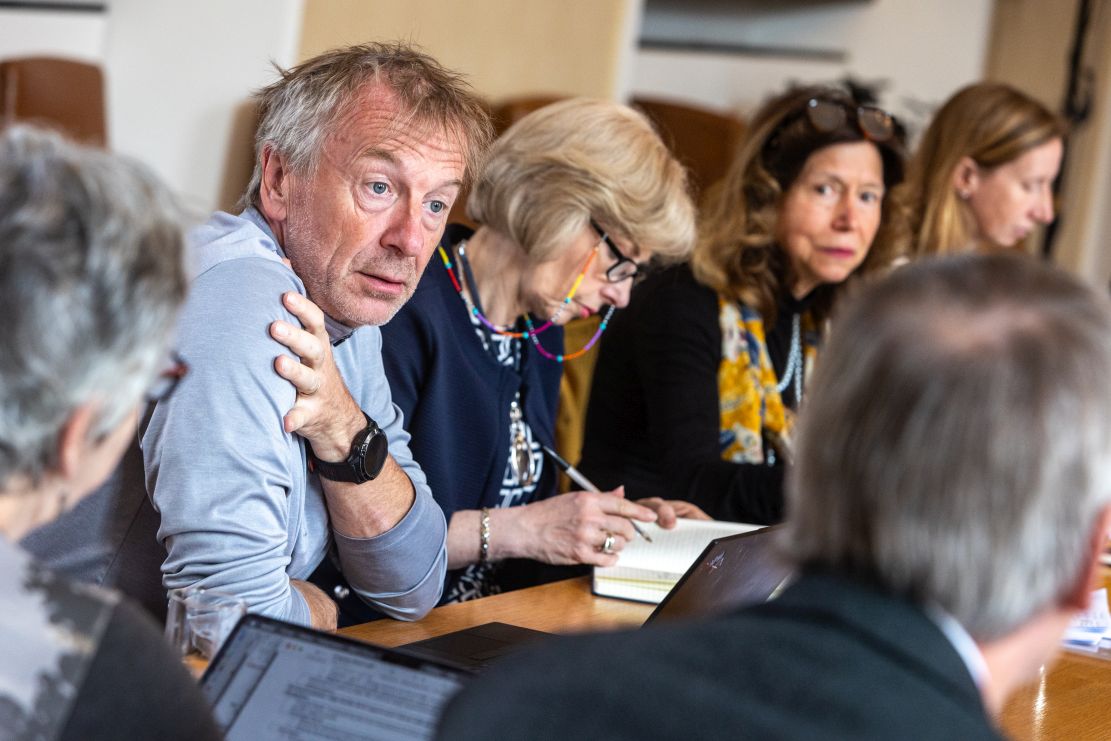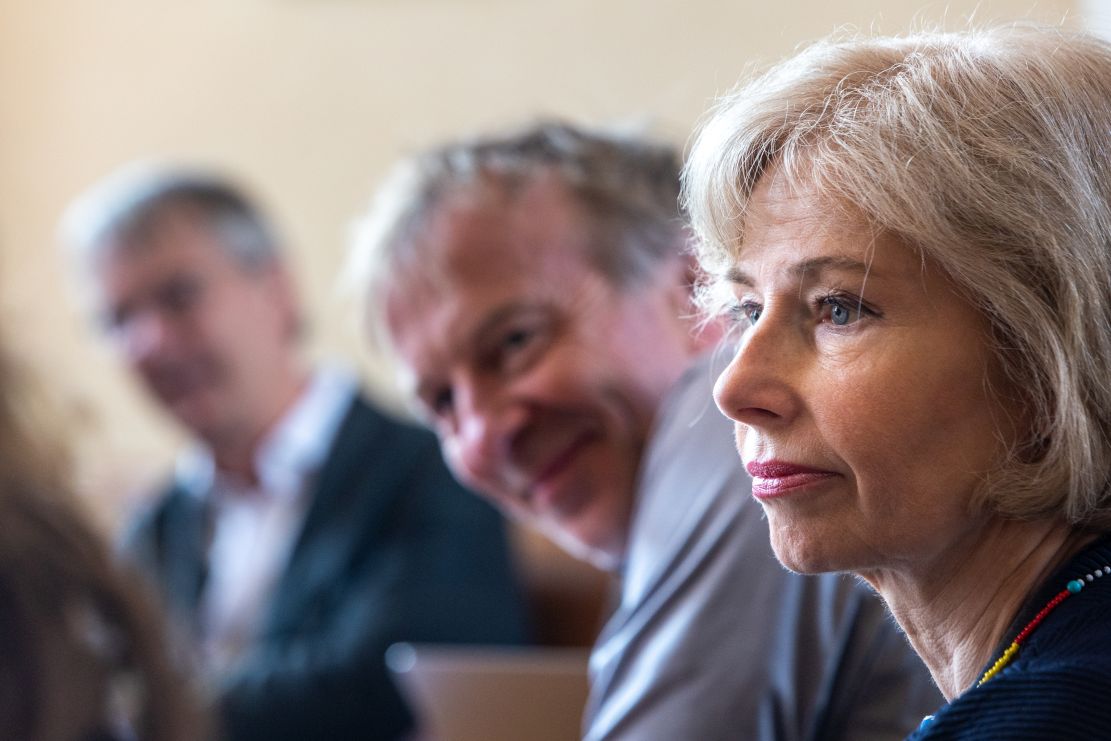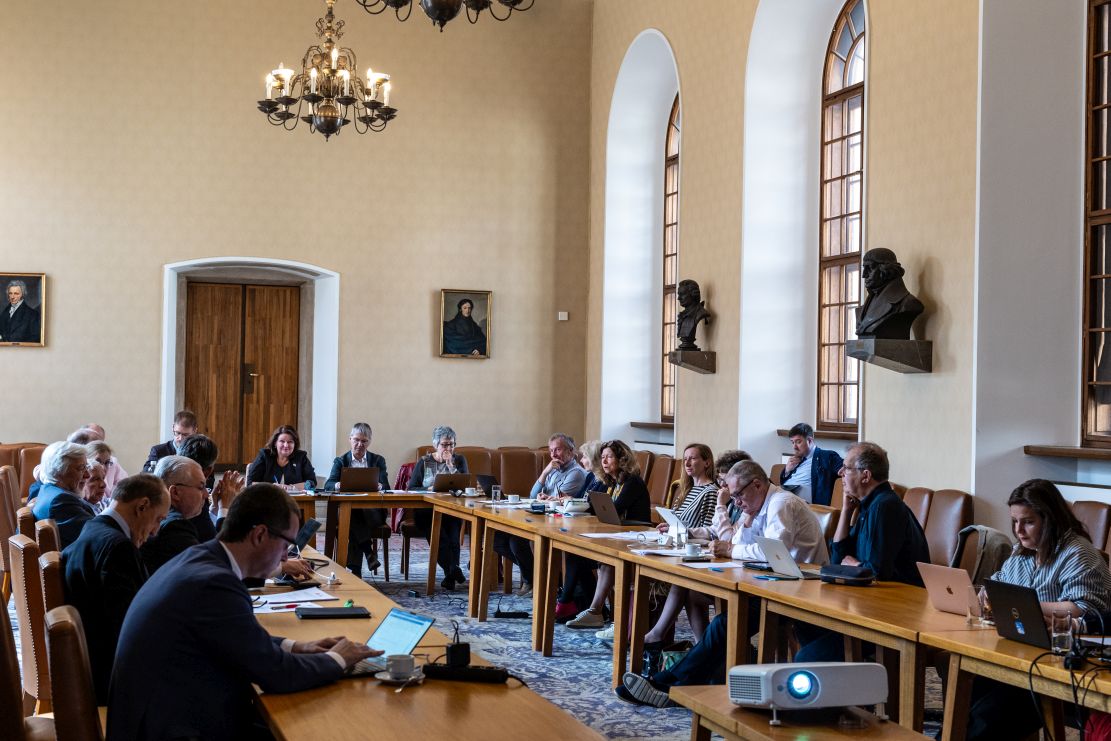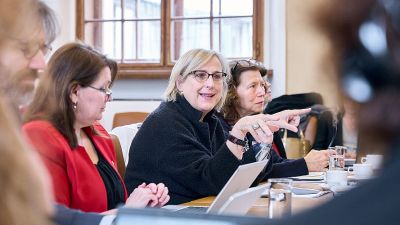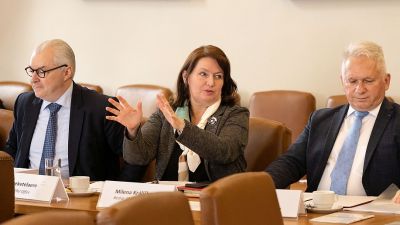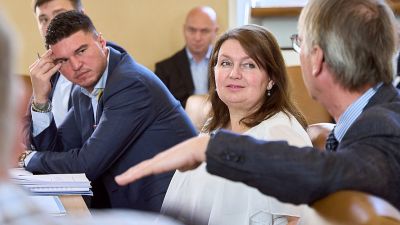If international advisory boards are one of the clearest signs that a university takes itself—and its future—seriously, then Charles University is in the most capable hands. The university’s board (IAB), an esteemed grouping of global academic leaders and policy minds, met at CU this week for its annual meeting to examine the path the school has cut over the last year. Members offered feedback, guidance, lively discussion, and constructive criticism on present and future strategic challenges.
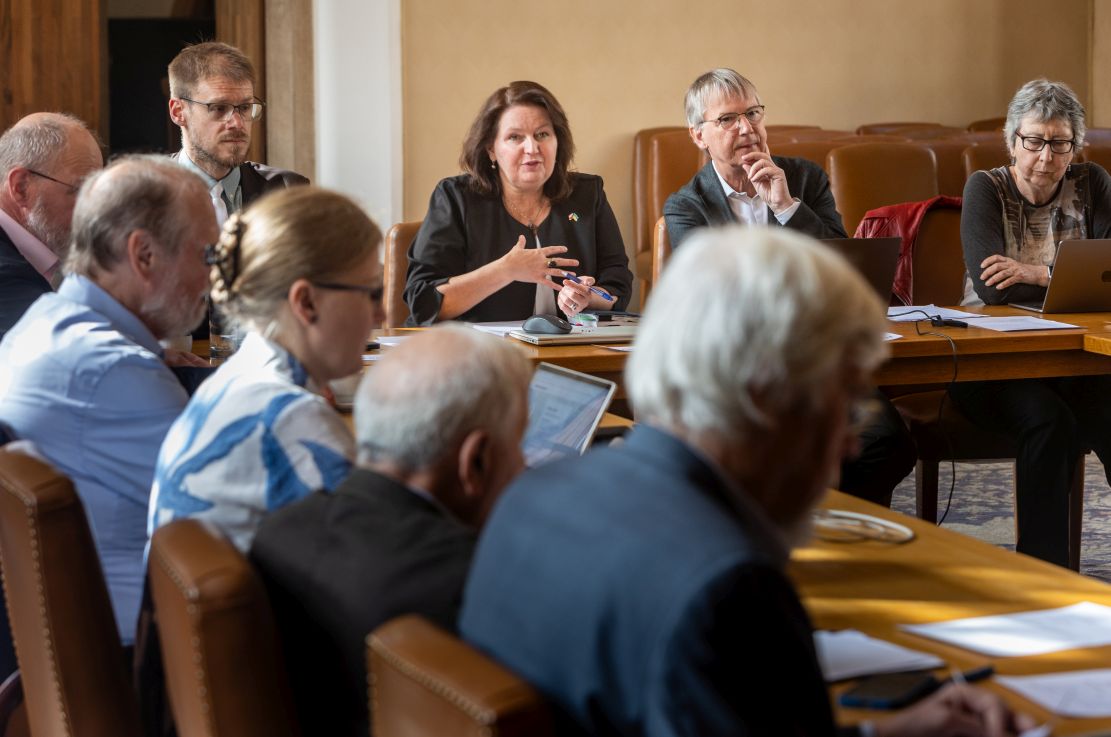
Rector Milena Králíčková speaks at the annual IAB meeting at Charles University in 2025 - outlining school priorities in what is an election year.
Opening the main day of proceedings on 14 May, Rector Milena Králíčková outlined key areas titled “Response to IAB Recommendations from May 2024.” The focus areas for the meeting’s opening block were as follows: Technology Transfer, Research Management & Support, Microcredentials, Graduate Success, and Doctoral Education Reform.
This year’s meeting saw the arrival of some new faces, but also the return of steady hands and outspoken voices on the board, including Doris Alexander of Trinity College Dublin, Hans Georg-Kräusslich of the University of Heidelberg, David Bogle of University College London, Sally Mapstone of the University of St Andrews, and Keith Gull of Oxford University. Altogether, too many to name here: you can read about each IAB member in full here.
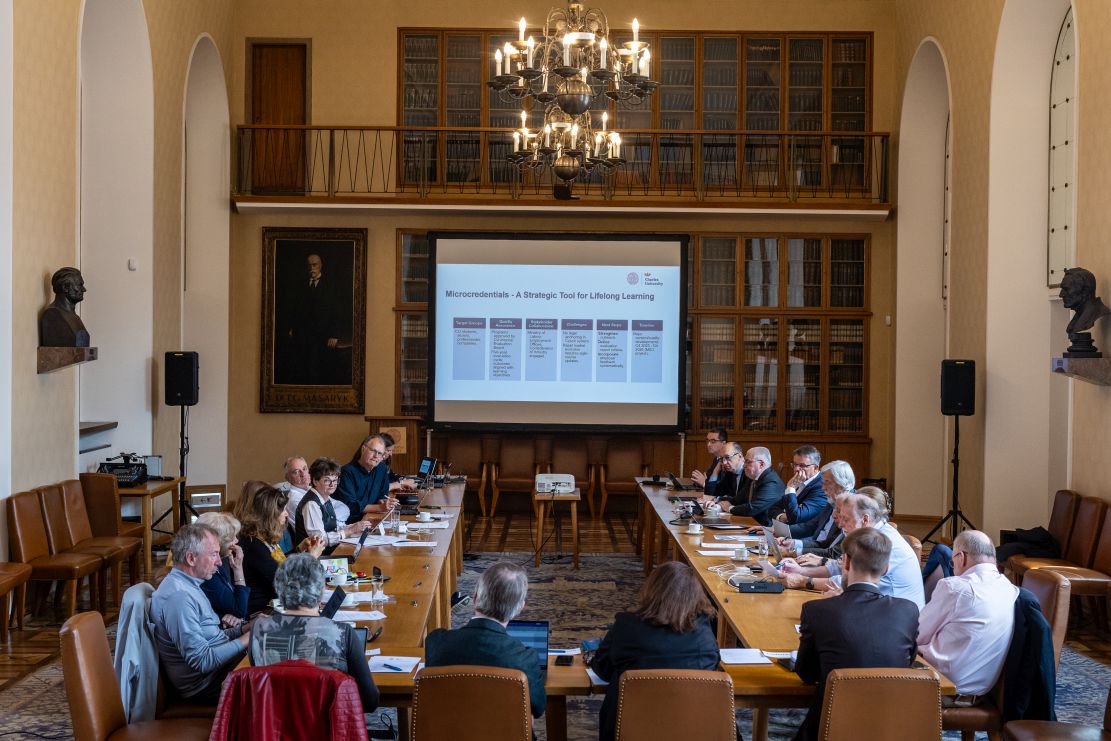
The annual IAB meeting takes place over three days, the most important of which, arguably, is the first meeting on Day 2.
Spotlight on doctoral reform
PhD studies prompted some of the most robust discussion—both for the steps CU had already anticipated and for those it now aims to exceed. This year, an amendment to the Czech Higher Education Act introduced significant changes to doctoral funding. Effective 1 March 2025, the minimum guaranteed income for full-time doctoral students was set at 1.2 times the minimum wage—translating to approximately CZK 25,000 (about €1,000) per month.
While the increase aims to improve financial support for doctoral candidates—especially as cost-of-living pressures rise—it also comes with a likely reduction in available positions. Universities will, generally speaking, have to be more selective, and insiders expect the number of PhD students to drop by around 30%. This shift is seen as a move towards quality over quantity: prioritising the most capable and committed candidates and improving their overall conditions.
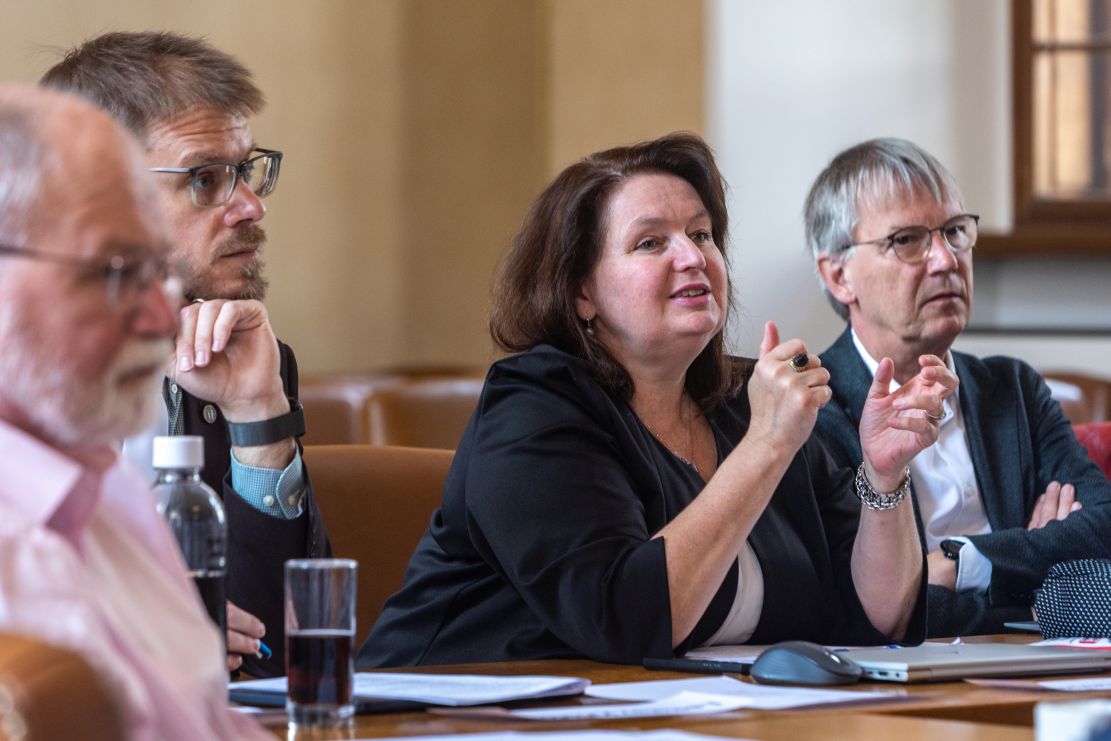
Vice-Rector Ladislav Krištoufek, flanked by David Bogle, on the left from the rector at the IAB meeting.
In the coming weeks, Forum CZ will feature an entire issue on the topic, including an exclusive interview with Vice-Rector for Research Ladislav Krištoufek. For now, the vice-rector, who gave a key presentation on PhD studies reform at the meeting, told Forum that the reforms being implemented by the state—and by extension the university—were a nothing if not a step in the right direction:
“It’s a positive move, that’s for sure. Of course, there is always a question about many technical details behind it that have to be ironed out by individual universities. It’s good that we have the freedom and responsibility to make our own rules, and overall reforms were certainly needed. Now we have to make it work.
One thing that I am quite sad about is that the financing part, while very important, became one of the only things discussed, which certainly should not be the case. Behind all of this we can talk about the selection process and funding, but at the forefront should be a discussion about quality and overall a better environment for PhD studies. For students who really want to succeed (and supervisors looking to mentor them and push them towards success). That, I think, is really the most important thing. Creating an environment where it all works.”
Feedback
The IAB was generally supportive of the steps taken so far, with members providing examples from their own institutions. The chair of the meeting advocated for a unified set of goals that Charles University could consider—ideally ones which cross disciplinary lines and faculties.
One interesting moment came with the observation that much of the material provided to the IAB by CU reflected a strong top-down approach. One member pointed out that the university should also be careful to draw upon innovation and best practices already in place at the faculty level. Not all reform needs to be centralised. Charles University, with its 17 faculties, is far from a monolith—it’s a diverse academic ecosystem (even if the broader goal is to execute transparent, effective, and widely supported governing measures). The suggestion was clear: while reform can start and is inevitably approved at the top, it shouldn’t ignore what’s already working well in the departments and institutes below.
PhDs beyond academia
Another recurring theme was the need for institutions to better communicate the varied futures PhD graduates can pursue—particularly outside academia. From innovation and public sector roles to civic engagement and industry, there is much to gain from showing what highly trained minds can bring to society more broadly. Popular video and podcast series can be a powerful vehicle in this respect. Forum, for example, has run the series Science at CU in One Minute and has featured the Forum Radio podcast for some time. One illustrative example? An interview with the first female Czech rabbi—an inspirational reminder of the broad and diverse paths that postgraduates take.
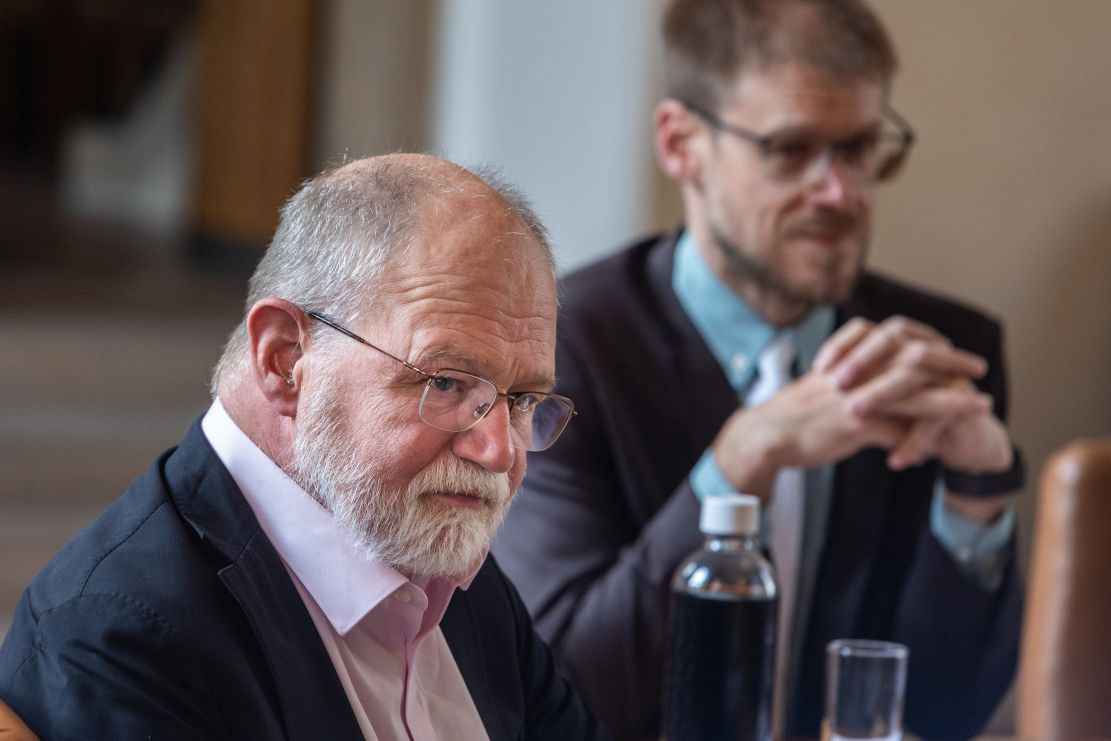
David Bogle in the foreground; behind him, CU's Vice-Rector for Research, Ladislav Krištoufek.
Many of the steps now being implemented at CU were seen as foundational. In the view of several IAB members, the framework being established today is effectively the groundwork for a future graduate school—one that would bring doctoral studies under a more unified and quality-assured structure. As for students leaving academia after getting a PhD? Not that unusual, IAB member David Bogle told Forum:
“I have statistics showing that in France, the UK, and the US, it has always been that more than 50 percent have immediately left academia. Some of the remaining 50 percent stay on as post-docs but even there, they move outside eventually as well. In Germany it’s even higher.
As far as we are concerned, this has always been a natural step: we are about training people within society and within the nation. Some of that is within academia and some of that is outside. People from Life Sciences go into agriculture, and others into engineering—and even in the humanities and social sciences there are roles for people to get out there and make informed decisions on research and policy.
Their experience allows them to strip down problems to their fundamentals, to develop the original evidence to demonstrate their point. That is what PhDs are about. Of course, it has taken employers a while to get on board, and I think it would be helpful if the media played a better role in that. Imagine if the media really showed how that can help in government, policy-making, or business.”
Back to the future
There is room for further reform, and doctoral education was just one of several issues on a full and pressing agenda. But it’s also clear that Charles University isn’t drifting. The rules, the dialogue, and the very act of answering difficult questions in front of a room of global experts—this is a university intent on shaping its future, not being shaped by it.
In the end, the IAB doesn’t hand out grades. But if it did, this year’s opening block felt less like a polite roundtable (which it was) and more like an academic defence: sharp questions, fair pressure, and enough tension to show that what’s at stake is real. It is both paramount and reassuring that key aspects considered by those in charge are so carefully weighed.
